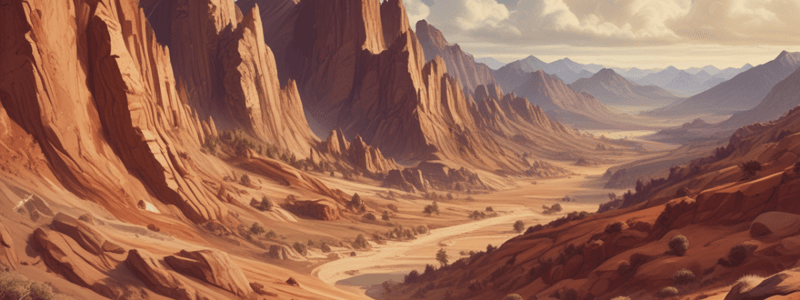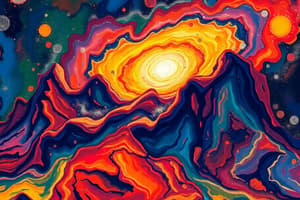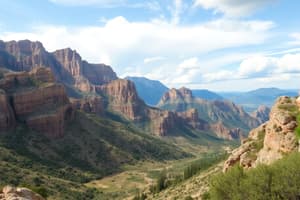Podcast
Questions and Answers
What is a characteristic of minerals that distinguishes them from rocks?
What is a characteristic of minerals that distinguishes them from rocks?
- They have a specific crystalline structure (correct)
- They are multicolored
- They have a definite shape
- They are always small in size
What happens to magma when it cools and hardens?
What happens to magma when it cools and hardens?
- It becomes a rock
- It disappears completely
- It becomes a mineral (correct)
- It remains in its liquid form
What is one way that minerals can be classified?
What is one way that minerals can be classified?
- By their chemical composition and crystalline structure (correct)
- By their color and shape
- By their solubility in water
- By their size
What is an example of a mineral?
What is an example of a mineral?
What is NOT a characteristic of minerals?
What is NOT a characteristic of minerals?
What is a characteristic of rocks that distinguishes them from minerals?
What is a characteristic of rocks that distinguishes them from minerals?
Where is pyroxene usually found?
Where is pyroxene usually found?
How do geologists classify crystal structures?
How do geologists classify crystal structures?
What is an example of a cubic closed paced or CCP crystalline structure?
What is an example of a cubic closed paced or CCP crystalline structure?
What is the study of rocks called?
What is the study of rocks called?
What is the main difference between rocks and minerals?
What is the main difference between rocks and minerals?
What is the process by which sedimentary rocks are made?
What is the process by which sedimentary rocks are made?
What type of rock is Granite an example of?
What type of rock is Granite an example of?
What percentage of the Earth's crust is sedimentary rock?
What percentage of the Earth's crust is sedimentary rock?
What is the rock cycle?
What is the rock cycle?
Flashcards are hidden until you start studying
Study Notes
Rocks vs Minerals
- Rocks are solids found in the earth's crust, but are different from minerals
- Minerals are naturally occurring substances with unique chemical and physical properties
- Minerals are inorganic, multicolored, have a specific structure, and are defined by their chemical composition
Mineral Definition
- Minerals are inorganic uniform chemical compositions of a solid that have a crystalline internal structure and occur naturally
- Minerals can be made from multiple types of elements or just one
- Minerals can be vast or very small, like a grain of sand
- Example of a mineral: Salt (NaCl)
Classifying Minerals
- Minerals are classified by their chemical composition and crystalline structure
- Other ways to characterize minerals include examining color, density, hardness, streak, luster, and solubility
- Geologists classify crystal structures by counting the number of sides, measuring the angles, and observing cleavage and fracture
- Three main types of crystalline structures:
- Body-Centered Cubic (BCC)
- Hexagonal Close-Packed (HCP)
- Cubic Close-Packed (CCP)
Rock Definition
- A rock is a solid interconnected collective of two or more crystalline minerals
- Rocks are usually made up of various types of mineral grains, held together in one solid form
- Rocks do not always have a repeating arrangement of atoms like minerals do
Classifying Rocks
- Rocks are classified based on how they are formed
- Rocks are made through the rock cycle which either creates new rocks or recycles old rocks
- Three main rock classifications:
- Igneous
- Sedimentary
- Metamorphic
- Igneous rocks are made from hot magma that cools to create rock
- Sedimentary rocks are made over time by pressure from other rocks
- Metamorphic rocks are made from other rocks through chemical reactions and heat
The Rock Cycle
- The rock cycle is the process in which all rock is made or recycled
- Rocks can change from one type to another through geological processes
Is a Rock a Mineral?
- A rock is not a mineral, and minerals do not always make rocks
- Most rocks are made of minerals, but some rocks have no minerals
- Examples of rocks with minerals: granite, shale, limestone, marble, sandstone, coal
- Examples of rocks without minerals: peat, chalk, flint
Studying That Suits You
Use AI to generate personalized quizzes and flashcards to suit your learning preferences.




